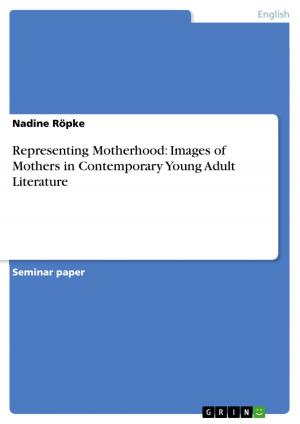Does an enlargement of the European Union inhibit the party establishment of a European party system? Case study of Turkey
Nonfiction, Social & Cultural Studies, Political Science| Author: | Daniel Schmidt | ISBN: | 9783638050579 |
| Publisher: | GRIN Publishing | Publication: | May 20, 2008 |
| Imprint: | GRIN Publishing | Language: | English |
| Author: | Daniel Schmidt |
| ISBN: | 9783638050579 |
| Publisher: | GRIN Publishing |
| Publication: | May 20, 2008 |
| Imprint: | GRIN Publishing |
| Language: | English |
Seminar paper from the year 2007 in the subject Politics - International Politics - Topic: European Union, grade: 2,0, University of Twente (Political Institute ), 26 entries in the bibliography, language: English, abstract: 1. Introduction The European Union (EU) has been a very heterogeneous building since the start. The difficult task is forming a party system which fits the different national parties in coalitions that are able to produce results. With the now 25 members this seems even more problematic, since the states of Eastern Europe have a tradition that differs significantly from the countries in Northern and Western Europe. It is, therefore, necessary to prove if party cohesion on the European level exists. If members of European Parliament (EP) would only vote on national interest, party coalitions would not serve their purpose. There needs to be cohesion towards the coalition in order to establish real European elections instead of second order national elections. In order to achieve this it is also necessary to be able to have a public opinion that can be organized into majorities (Beetham/Lord, 2001:77). The questions, therefore, remain if the EU is able to establish even more members in its middle. It might be the case that new members would decline the party cohesion even further and that would make It even more difficult to establish true European elections. In this paper, special emphasis will be on the role of Turkey and the adoptability into the party system. The leading hypotheses will be that the cleavages lines which are important for Turkish voters are too different in order to adopt to leading European ideas. A sup-question is also if the Eastern European countries have yet performed this step. The paper will start with a normative frame that points out how an ideal democracy could work on the European level. Because of shortage of space this can not be discussed in total depth, but the presented ideas will serve as a framework. After the theoretical part, the focus will be on the European system as it works today. Special emphasis will be on the party coalitions and their impact on the voting behaviour of members of parliament (MEP). It is essential to describe why national parties have agreed to work together and what political solutions they prefer. Since there are seven coalitions in the EP today, not all can be fully analysed. Therefore, the two biggest groups (EVP-ED and SPE) will mainly be the focus, since they hold over 60% of the seats. The next part will analyse the Turkish system and what kind of issues are deciding for Turkish voters. The history of democracy will be the starting point of this analysis before the present situation will be the focus. The conclusion will, therefore, be based on the question if Turkey's party system can adapt to the EU, and, thus, the entry of Turkey into the EU is feasible taking these conditions into account.
Seminar paper from the year 2007 in the subject Politics - International Politics - Topic: European Union, grade: 2,0, University of Twente (Political Institute ), 26 entries in the bibliography, language: English, abstract: 1. Introduction The European Union (EU) has been a very heterogeneous building since the start. The difficult task is forming a party system which fits the different national parties in coalitions that are able to produce results. With the now 25 members this seems even more problematic, since the states of Eastern Europe have a tradition that differs significantly from the countries in Northern and Western Europe. It is, therefore, necessary to prove if party cohesion on the European level exists. If members of European Parliament (EP) would only vote on national interest, party coalitions would not serve their purpose. There needs to be cohesion towards the coalition in order to establish real European elections instead of second order national elections. In order to achieve this it is also necessary to be able to have a public opinion that can be organized into majorities (Beetham/Lord, 2001:77). The questions, therefore, remain if the EU is able to establish even more members in its middle. It might be the case that new members would decline the party cohesion even further and that would make It even more difficult to establish true European elections. In this paper, special emphasis will be on the role of Turkey and the adoptability into the party system. The leading hypotheses will be that the cleavages lines which are important for Turkish voters are too different in order to adopt to leading European ideas. A sup-question is also if the Eastern European countries have yet performed this step. The paper will start with a normative frame that points out how an ideal democracy could work on the European level. Because of shortage of space this can not be discussed in total depth, but the presented ideas will serve as a framework. After the theoretical part, the focus will be on the European system as it works today. Special emphasis will be on the party coalitions and their impact on the voting behaviour of members of parliament (MEP). It is essential to describe why national parties have agreed to work together and what political solutions they prefer. Since there are seven coalitions in the EP today, not all can be fully analysed. Therefore, the two biggest groups (EVP-ED and SPE) will mainly be the focus, since they hold over 60% of the seats. The next part will analyse the Turkish system and what kind of issues are deciding for Turkish voters. The history of democracy will be the starting point of this analysis before the present situation will be the focus. The conclusion will, therefore, be based on the question if Turkey's party system can adapt to the EU, and, thus, the entry of Turkey into the EU is feasible taking these conditions into account.















